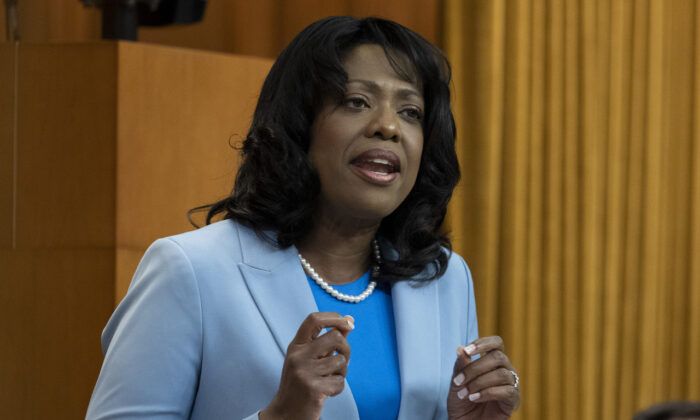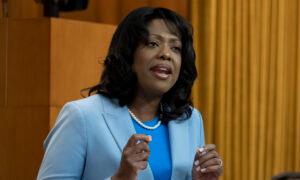Conservative MP Leslyn Lewis expresses concern that incoming U.S. President Donald Trump is serious about making Canada the ‘51st’ U.S. state. She believes that the Declaration of North America (DNA) agreement signed between the countries in 2023 has weakened Canada’s sovereignty.
“
Predictively, the elites will claim the DNA will have no impact on Canadian sovereignty. In the end, we wait until it innocuously seeps in and impacts our national rule-making, eventually becoming a part of our national DNA,” Lewis said in a post on social media platform X on Dec. 28.
Lewis expresses her concerns about the Declaration of North America (DNA)
agreement signed between Trudeau, U.S. President Joe Biden, and Mexican President
Andrés Manuel López Obrador in 2023. She noted that while Canadians have been told the agreement is non-binding, many international agreements that are non-binding end up impacting Canadian laws.
The DNA agreement aims to enhance “security, prosperity, sustainability, and inclusiveness” among the North American countries through commitments related to the “six pillars” of diversity, equity, and inclusion; climate change and the environment; competitiveness, migration and development; health; and regional security.
It calls for the three countries to take action on priorities like clean energy solutions, addressing the root causes of “irregular migration,” building more resilient health systems, and enhancing security cooperation.
“The commitments made during this summit are rooted in a shared vision for a more equitable, just, inclusive, resilient, secure, and prosperous North America and a shared responsibility to achieve more equitable outcomes responsive to the needs and aspirations of our citizens,” reads a January 2023 press release from the Prime Minister’s Office.
Lewis asserts that
President-elect Donald Trump is “serious about Canada becoming the 51st state,“ and the international law landscape had ”already set the tone,” for this to happen. Lewis was responding to a Dec. 25 social media post by Trump, where
he again called Prime Minister Justin Trudeau “Governor Trudeau” and mused about the benefits of Canada joining the United States.
“If Canada was to become our 51st State, their taxes would be cut by more than 60 percent, their businesses would immediately double in size, and they would be militarily protected like no other country anywhere in the World,” Trump wrote.
The incoming U.S. president has been threatening Canada with 25 percent tariffs if Ottawa does not take adequate steps to improve border security and stop the flow of illegal drugs and immigrants. The federal government has subsequently announced measures to strengthen the Canada-U.S. border, such as a $1.3 billion border plan to create a new North American task force targeting organized crime and drug trafficking, and increased funding for helicopters, drones, and surveillance towers.
Concerns With Previous Agreements
Lewis, who holds a PhD in international law, has previously raised concerns with the World Health Organization (WHO) global pandemic response treaty in 2022, saying the agreement would limit Canada’s sovereignty in areas like decisions on border closures or on the type of personal protective equipment that could be mandated.
While the treaty would be legally binding, the Public Health Agency of Canada has
said the WHO “has no jurisdiction in Canada“ and the country would remain in control of ”any future domestic decisions about national restrictions or other measures related to pandemics.”
In 2023, Lewis expressed concern
with Canada signing onto the Agile Nations network, which the World Economic Forum has said is meant to facilitate new technologies like gene editing and AI as part of the “Fourth Industrial Revolution.“ She called this a ”radical policy shift” from the current governance model, and questioned how Canada had joined on to the initiative without the issue being openly discussed in Parliament.
In early 2024, Lewis also sponsored a
petition filed in the House of Commons calling for Canada to pull out of the United Nations, with the petition stating Canada’s membership in the U.N. and its subsidiary organizations “imposes negative consequences on the people of Canada.”





